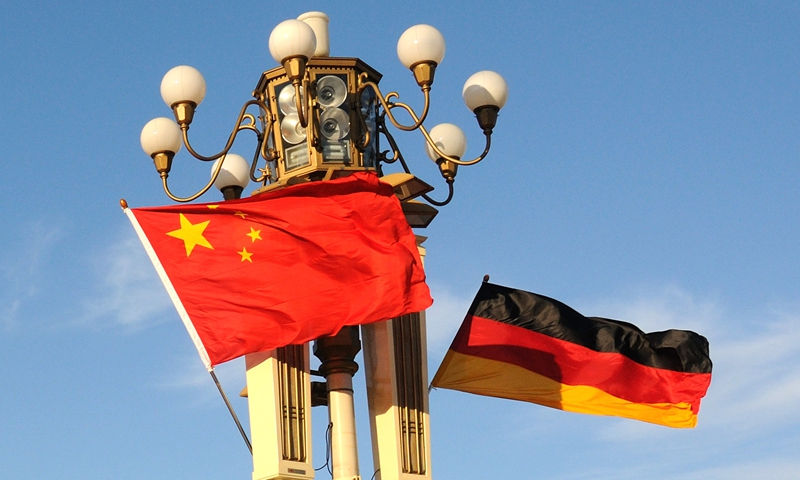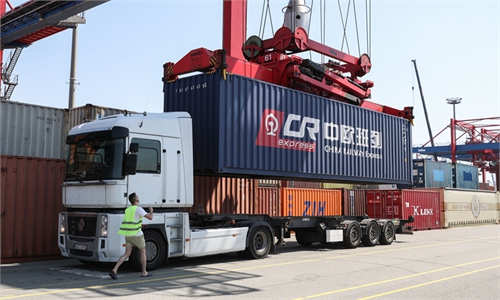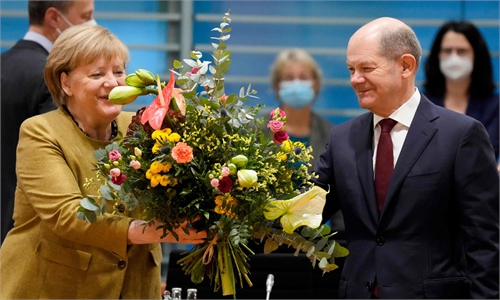China-Germany relations won’t seriously derail despite small bumps: Global Times editorial

Photo: Xinhua
Germany's Social Democrats, the Green Party and Free Democratic Party have sealed a deal for a new government. The deal mentioned China 12 times and said Germany will develop relations with China "in the dimensions of partnership, shaping competition and system rivalry." It also said, "As part of the EU's one-China policy, we support the factual participation of democratic Taiwan in international organizations." The deal also interfered in the affairs related to China's Xinjiang and Hong Kong.German Chancellor Angela Merkel will step down in early December. Olaf Scholz of the Social Democrats will become the new chancellor. The positions of ministers in this "traffic light" coalition government will be shared by the three parties. Green Party leader Annalena Baerbock is very likely to become foreign minister. She always advocates a tough China approach and calls for trans-Atlantic negotiations on the China policy.
China-Germany relations may encounter frictions in the transition period. It is worth mentioning that the relatively steady China policy adopted by Merkel was not formed in one day. Sixteen years ago, she took the lead among European leaders to meet the Dalai Lama, which severely jeopardized China-Germany ties. Then she gradually realized the importance of China and began constructing a pragmatic China policy, which later affected the EU's China policy. Today's China is much more powerful than it was years ago. A constructive China-Germany relationship matters more to German society. The new German government cannot ignore this fact when dealing with China.
Faced with the potential impulse of the new German government to act boldly on China-related issues, China may as well calmly respond by "letting the bullets fly for a while." We need to be confident that the new German government will not go far in this regard. Based on this judgment, we should identify the nature of some of Germany's radical words and deeds.
We need to play a shaping role in safeguarding the overall interests of China-Germany relations. However, if some new German officials go quixotic, we should not hesitate to fight and set up rules, so as to give a proper start to new bilateral exchanges and establish an accurate coordinate for the new German governing team's understanding of China.
Nothing major will happen to China-Germany relations. Even if something does, there will be numerous points for the two countries to go back. Germany's national interests do not lie in joining hands with the US to confront China. After Merkel leaves office, all the reasons that prompted her to implement a prudent policy toward China will remain. Although some politicians are keen to show toughness against China, Germany will not have a "Trump" or a "Biden." The room for twists and turns in China-Germany relations is bound to be limited.
Ideologically, Germany may be hostile toward China - this is the case in the West - but a war on words will be Berlin's main battlefield with China. China needs to adapt to the situation where Western public opinion is not in China's favor, while arguing with them without losing ground or getting angry.
The "traffic light" coalition has made tough talk about China, but it will not be easy to implement those words. Scholz hasn't been seriously radical against China so far. The Green Party's extreme views on China are likely to diminish as the new government takes office.
So no matter what Germany's new ruling team says, China will take greater initiative in shaping China-Germany relations in the long run. Because we are willing to maintain a sound comprehensive strategic partnership between China and Germany, and the chances of long-term maintenance of this relationship are far greater than the chances of serious damage to it.



